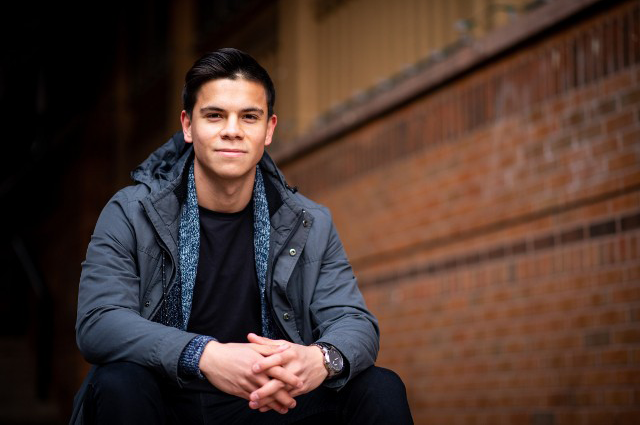Tomorrow’s Engineers: Eduardo Vargas Gutierrez

Eduardo Vargas Gutierrez is a double major in mechanical engineering and mathematics, a STEM Ambassador (an outreach program run by the Center for STEM Diversity and open to students from the School of Arts and Sciences and the School of Engineering), and member of the Tufts Society for Latinx Engineers and Scientists, as well as a mathematics tutor for the StAAR Center.
When I started taking engineering classes, I fell in love with the idea of product design. To sketch out an idea, make calculations for its performance, and then build, test, improve—I absolutely love that process.
One of my Tufts highlights was from an engineering design class with Associate Teaching Professor Gary Leisk. We were given a structure that’s shaped like the letter C, and using a 3D program, we had to design a new structure that would be able to bend to a certain degree and also suffer a certain amount of stress. My team went over more than 100 iterations to get what we wanted. Then our professor built it and tested it, and it performed exactly as we predicted. That was mind blowing.
To be a good engineer you have to think analytically, but also creatively. Even more important is to think of the impossible rather than just what is possible. I strongly believe that the work that I’m doing here at Tufts is bringing a different definition to impossible.
People are often too quick to say “No way, you can’t do that.” In most cases—almost all—there’s always a solution. You also have to learn to be OK with a lot of failure. Something always goes wrong, but that’s fine, because that allows for a lot of further thinking and reassessing and improving. At the end of the day, the good things, the meaningful things, are going to take time.
My dream job is to build either landers or rovers to support space exploration, whether it be to explore new planets, moons, whatever it is. A summer internship at Northrop Grumman in their aerospace systems division affirmed my goal to build rockets to go to Mars.
I just want to build things that are able to travel from Earth to somewhere that’s millions of miles away and have it fulfill its purpose, whether it’s gather biological samples, or even crash into the surface, so we can explore what’s out there in this insanely massive universe.
My job as a STEM ambassador is important to me too, as I think about the future of engineering. I know there are other kids who are in similar situations to me—they have a lot of big ideas and so much potential, but they might not know that STEM is for them.
But once you realize that is a possibility, countless doors open, and you understand all the things you can do for the world and for yourself. I was fortunate that my family was always encouraging. I learned early on: Just keep getting educated and chase your crazy dreams.
This excerpt is from "Who Are Tomorrow’s Engineers? Meet Five with Big Ideas" by Laura Ferguson, Tufts Now.
Department:
Mechanical Engineering